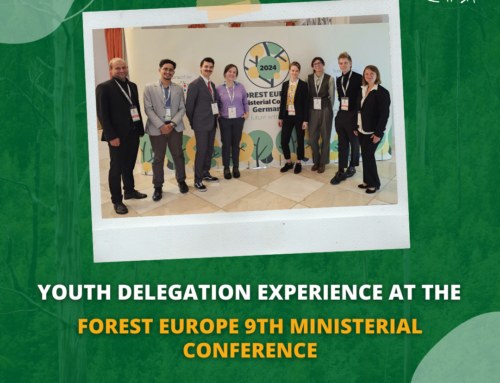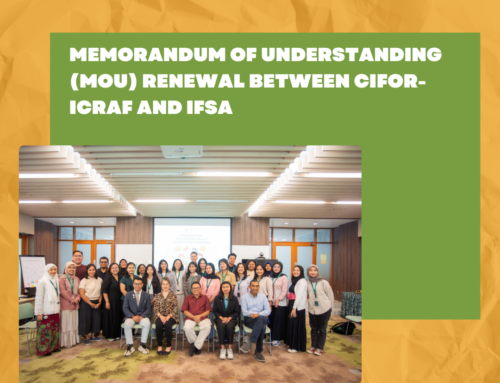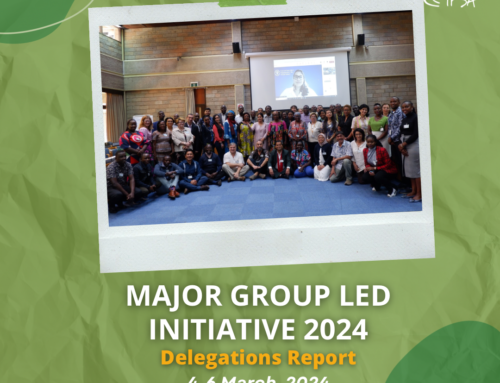UNFCCC COP26 Glasgow Experience
Author: Nele Römer
This year the United Nations Convention of Climate Change (UNFCCC) hosted the 26th Conference of Parties (COP26) in Glasgow, Scotland and IFSA had the opportunity to send a delegation of 10 persons. We want to give a small overview on COP26 importance, our experiences and the outcomes.
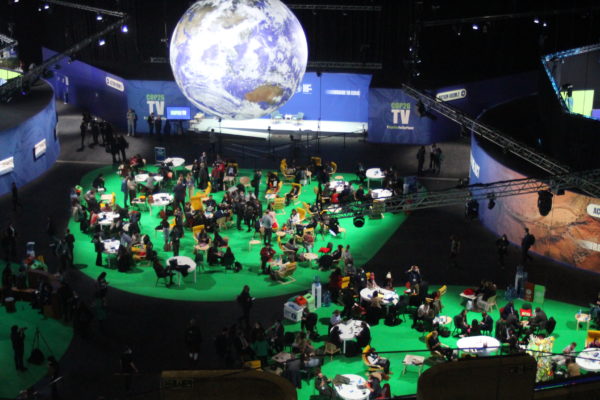
Credit: Nele Römer – The Action zone
First: What is COP26 exactly?
In the past three decades countries delegates were send yearly to design a global response to climate emergency we are facing for 30 years, recognized formally by the UNFCC formed 1992 in Rio de Janeiro. Bound by treaty every country on Earth should “avoid dangerous climate change” and should find ways to reduce greenhouse gas emissions equitably. The processes of the convention resample a rollercoaster of occasional triumph (speaking of the Paris Agreement 2015) and disaster in Copenhagen 2009 in progress.
Why is the COP26 so important?
Postponed due to Covid19, the COP26 was urgently needed since at The Paris Agreement parties committed, legally binding, to limit global warming “well below” 2°C above pre-industrial levels, but “pursue efforts” to limit heating to 1.5°C. Well, we know that there is vast difference between those numbers, set by the IPCC and 1.5°C would still result in natural disasters we are already facing eg. Forest fires, droughts, coral-reef dieback and more.
To reach this goal, so-called NDCs (Nationally Determined Contributions) were made – but are inadequate to fulfill the targets as they would result in disastrous 3°C warming. This inefficiency of NDCs was already known and to still secure the progress, the “ratchet mechanism” was set, which sets a return of countries delegates every five years to present better commitments. Pre-Cop26 NDCs result in a 16% decrease in emissions of needed 45%.
Therefore, COP26 is so important to renew the NDCs to an adequate level to maintain most of our planet’s health.
What was COP26 focus?
Currently NDCs represent the central part of negotiations, while topics of climate finance, phasing out coal and nature-based solutions were focused. For example, climate finance targets were not met since the 2009 Copenhagen made agreement to help countries of the global south in decreasing emissions and protection of extreme events. Another important point is the discussion on carbon trade as climate finance tool, which currently can be easily abused and leaks a lot in accountability.
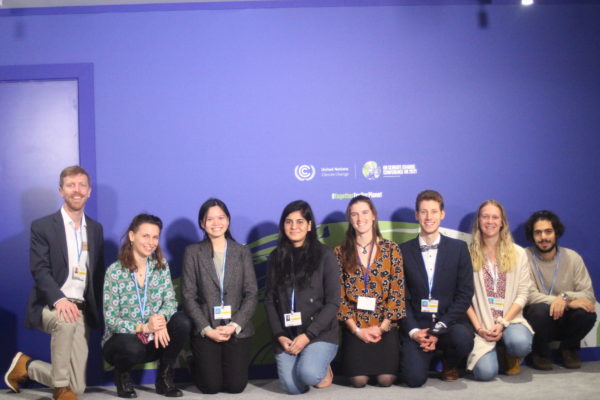
Credit: Nele Römer – The week 2 Delegation
How come we are part of it?
We are directly linked to youth participation and climate action, in natural environment, especially forests. Therefore, besides other countries delegations and so-called party/party-overflow participants, media etc. we tried to fill in our status as Observer NGO’s, a status every Non-Governmental Organization receives. As IFSA was given 15 badges for the conference, we applied to the open call of IFSA and luckily received confirmation in participation.
As Glasgow was completely overpriced in accommodations, we were staying outside the big city, in Kilsith and Edinburgh, and got to see a little more of hilly and beautiful Scotland, which was worth the long train rides.
What about Covid19?
Huge measures were taken to secure a safe conference, with historically 40.000 participants at many venues distributed in the city, but mainly the blue zone- where the “serious talking” happens. Everyone was urged to do a PCR-test after arriving in Scotland and daily self-administered testing and reporting to the local health care was needed. Masks were mandatory, as well as distancing and constant hand sanitizing was happening.
Personal impressions:
Our diverse delegation, consisting of 2 Indian, 2 US-American, 4 German, 2 Chilean, 2 Philippian, 2 Italian and 1 Belgian persons, had all a different insight in the conference. Gathering the voices of our delegation, one point was clear to all: we were overwhelmed by the amount of people of different perspectives, the chaos and number of different events and the insightful week(s) we had. Running to the train, coordinating your schedule for the day, go through several security check-ins, sit in High-level Segment sessions on the key negotiation points, to Briefings on negotiations status, to grabbing a free coffee and looking out for free snacks, listening, and discussing in the pavilion area environmental topics, watching world leaders summit digitally (since not enough seats were available to all), reschedule yourself for even more interesting panels, talking with open random strangers about climate policy, taking a breath in the action zone, meet youth delegates and coordinate interviews with politicians, eat something while talking, refill your water, sanitize, run through 1km hallway to not miss the entrance of an event and finally grab your coat to meet friends for dinner and some drinks at a pub with live music. Sleep and repeat, this was our daily hustle, and it was a lot of fun getting to know so many engaged people, hearing what drives them and listening to their inspirational perspectives. Also, the whole conference gave us an interesting insight in policy making and the power of collaboration. Our Highlight was the youth organizations, indigenous people and climate activists, which were organizing actions, demonstrations and network events. It gave us and me writing this, the energy we needed to proceed in climate action.

Credit: Nele Römer – Big plenary session on climate finance
Besides the inspiring words and people, we also realized that the event, claiming to be the most inclusive ever, hasn’t kept its promises. Many people from poor countries were struggling getting vaccinated and faced hard travel restrictions. Additionally in the first time ever, Observers were excluded from negotiations in the second week because of COVID-19 capacity limits or security concerns. At negotiations the civil counterweight was missing, as they account for transparency and feedback, while lobbyists of fossil fuel and other industries had access. Besides that, observers and young people were poorly included at the conference and mostly spoke at side events, while critical reflection was also lacking. The frustration of structural approach united with the frustration of the outcome: The Glasgow Declaration. Unfortuneatly we are far from 1,5°C, as the outcome is unbearable concerning recognition of loss and damage, climate justice, climate finance, fossil fuels and especially concerning ecosystems, like our specialty: Forests. Among the first and most significant announcements made at COP26 was the Glasgow Leaders’ Declaration on Forests and Land Use, in which 137 countries committed to collectively end forest loss and land degradation by 2030. Still, we all know best that implementation is a huge complex challenge.
Just a reminder: All currently set policies will lead to 2.7°C global warming; international enforceable agreements would lead to a 2.4°C warming and finally, if all made promises would be kept, we would still arrive at 1.8°C warming. BUT We do not have time for the privilege of waiting for the right NDCs to arrive, as people are facing the threat of death right now. This is a wakeup call for all of us to inspire, connect an act with other (young) people in the community, which is needed to proceed for #climateaction outside fancy conferences. Emissions continue to rise. The loss and damage is devastating. Trust has been breached. We need system change, not climate change.
Somebody I met there summarized that process as matchmaking of a perspective mosaic, as we are all coming from different worlds and need to check other perspectives for a broader picture, which is luckily never complete.
WE are unstoppable – another world is possible.
For deeper insight on COP26 Outcomes: https://www.carbonbrief.org/cop26-key-outcomes-agreed-at-the-un-climate-talks-in-glasgow
A brief summary on outcomes: https://climateactiontracker.org/documents/1002/CAT_2021-11-11_Briefing_GlasgowSectorInitiatives.pdf
